2025人教版高中英语必修第二册同步练习题--UNIT 4 Part 2 Discovering Useful Structures & Listening and Talking(含答案与解析)
文档属性
| 名称 | 2025人教版高中英语必修第二册同步练习题--UNIT 4 Part 2 Discovering Useful Structures & Listening and Talking(含答案与解析) |
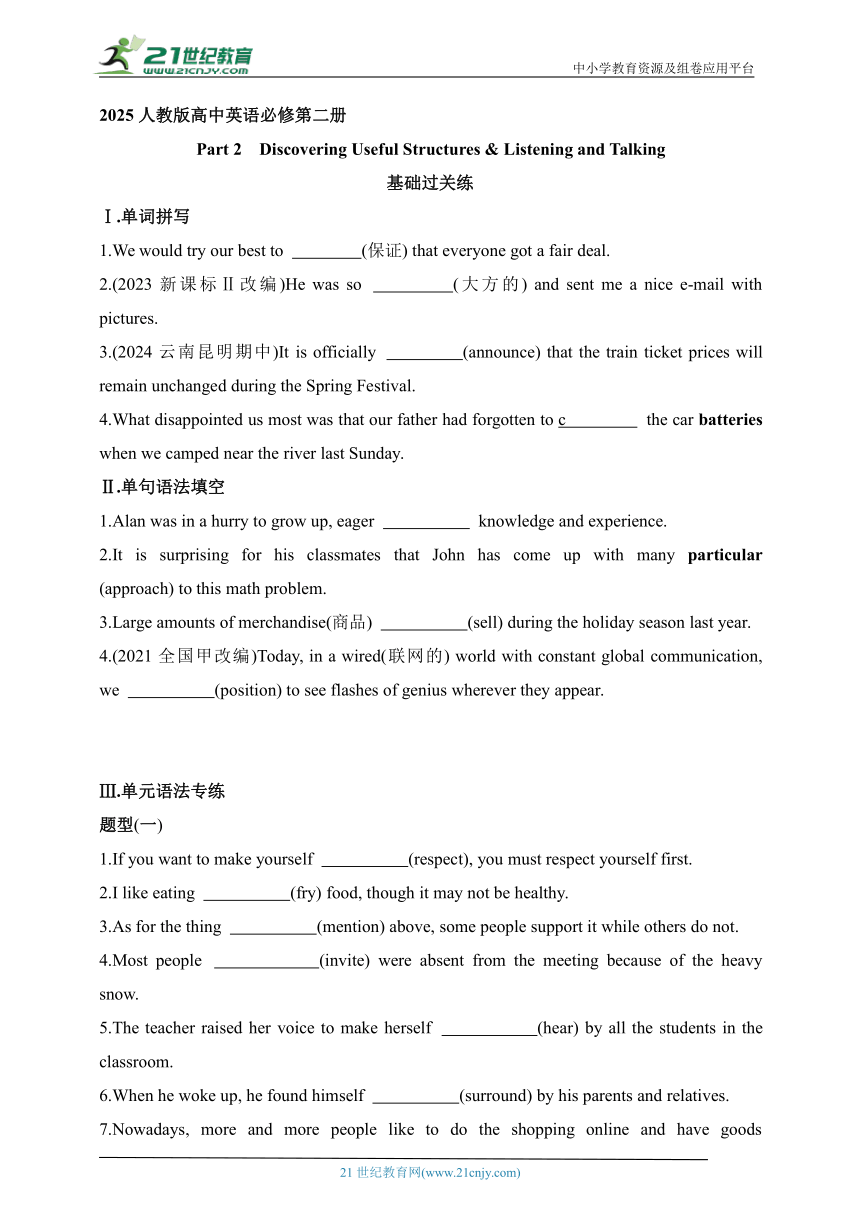
|
|
| 格式 | docx | ||
| 文件大小 | 349.5KB | ||
| 资源类型 | 试卷 | ||
| 版本资源 | 人教版(2019) | ||
| 科目 | 英语 | ||
| 更新时间 | 2024-06-19 22:33:59 | ||
图片预览

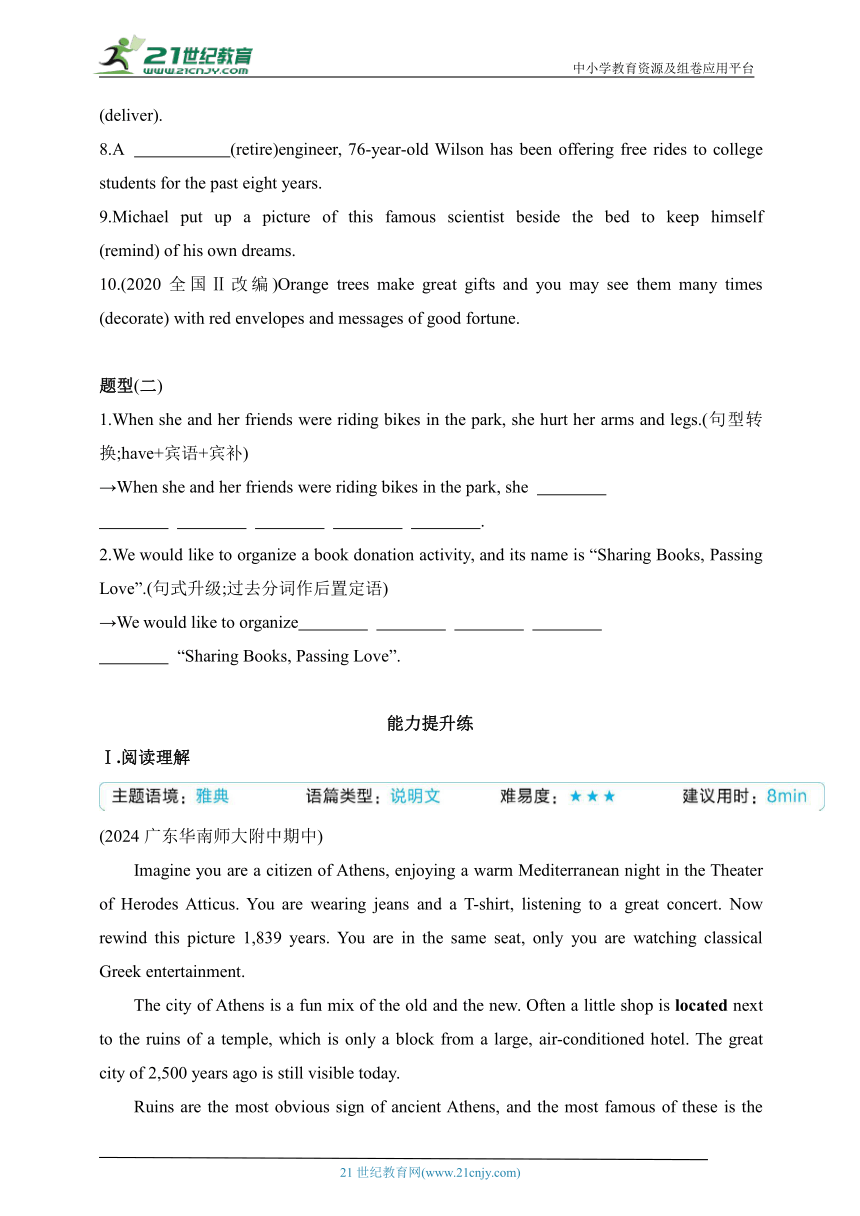
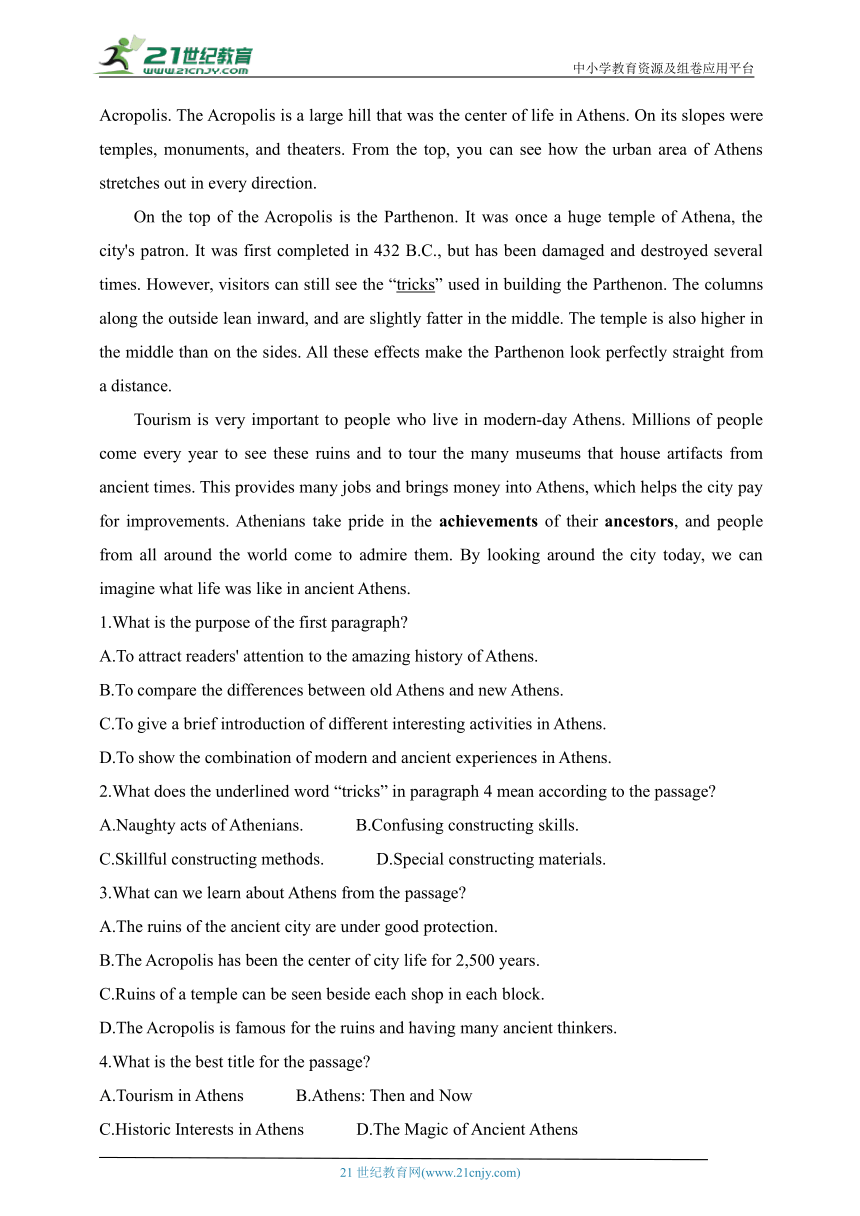
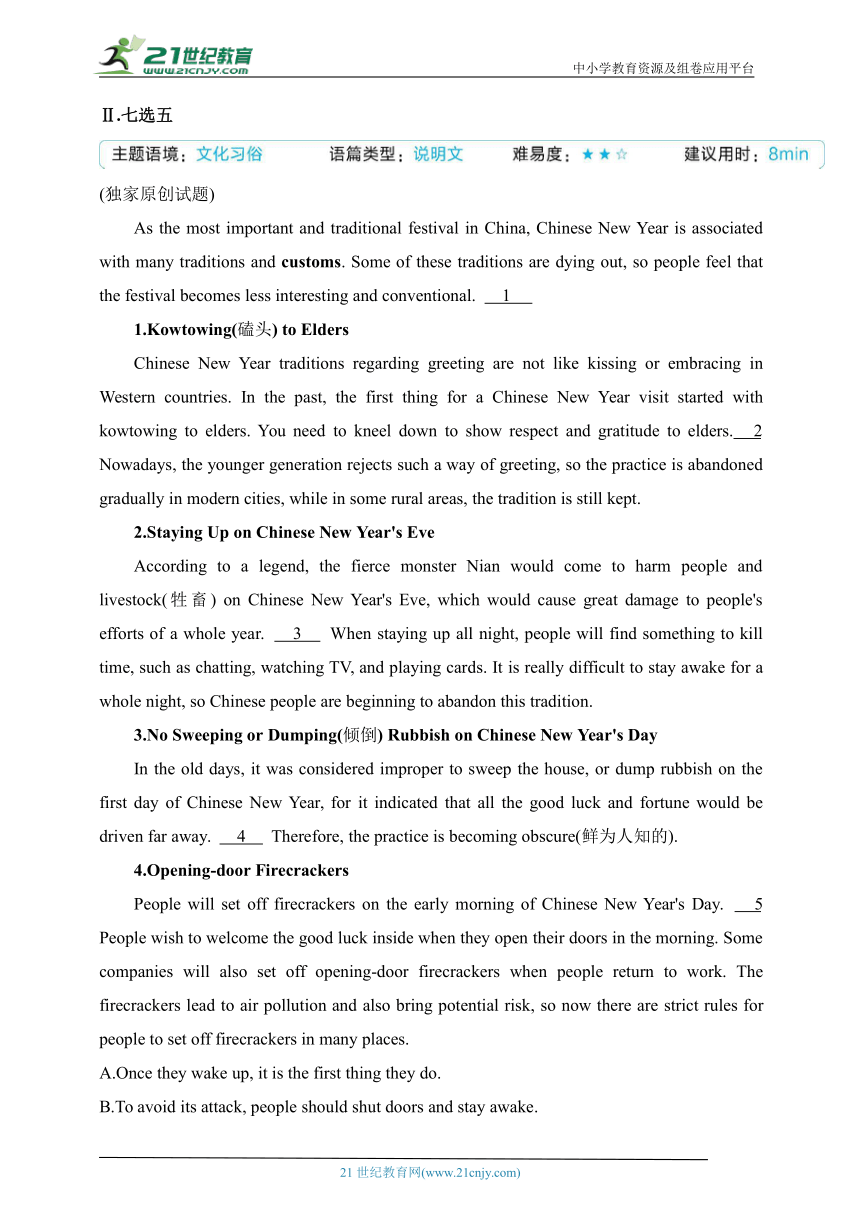
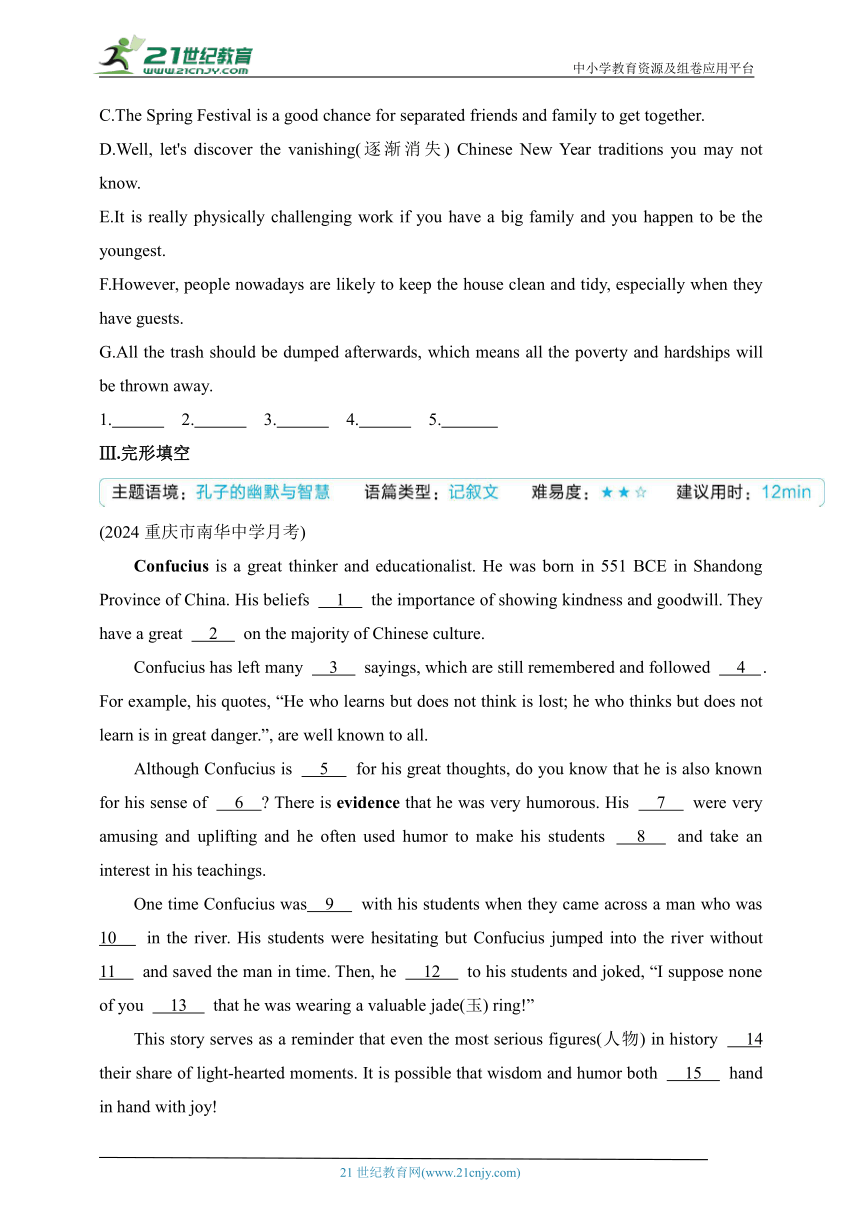
文档简介
中小学教育资源及组卷应用平台
2025人教版高中英语必修第二册
Part 2 Discovering Useful Structures & Listening and Talking
基础过关练
Ⅰ.单词拼写
1.We would try our best to (保证) that everyone got a fair deal.
2.(2023新课标Ⅱ改编)He was so (大方的) and sent me a nice e-mail with pictures.
3.(2024云南昆明期中)It is officially (announce) that the train ticket prices will remain unchanged during the Spring Festival.
4.What disappointed us most was that our father had forgotten to c the car batteries when we camped near the river last Sunday.
Ⅱ.单句语法填空
1.Alan was in a hurry to grow up, eager knowledge and experience.
2.It is surprising for his classmates that John has come up with many particular (approach) to this math problem.
3.Large amounts of merchandise(商品) (sell) during the holiday season last year.
4.(2021全国甲改编)Today, in a wired(联网的) world with constant global communication, we (position) to see flashes of genius wherever they appear.
Ⅲ.单元语法专练
题型(一)
1.If you want to make yourself (respect), you must respect yourself first.
2.I like eating (fry) food, though it may not be healthy.
3.As for the thing (mention) above, some people support it while others do not.
4.Most people (invite) were absent from the meeting because of the heavy snow.
5.The teacher raised her voice to make herself (hear) by all the students in the classroom.
6.When he woke up, he found himself (surround) by his parents and relatives.
7.Nowadays, more and more people like to do the shopping online and have goods (deliver).
8.A (retire)engineer, 76-year-old Wilson has been offering free rides to college students for the past eight years.
9.Michael put up a picture of this famous scientist beside the bed to keep himself (remind) of his own dreams.
10.(2020全国Ⅱ改编)Orange trees make great gifts and you may see them many times (decorate) with red envelopes and messages of good fortune.
题型(二)
1.When she and her friends were riding bikes in the park, she hurt her arms and legs.(句型转换;have+宾语+宾补)
→When she and her friends were riding bikes in the park, she
.
2.We would like to organize a book donation activity, and its name is “Sharing Books, Passing Love”.(句式升级;过去分词作后置定语)
→We would like to organize
“Sharing Books, Passing Love”.
能力提升练
Ⅰ.阅读理解
(2024广东华南师大附中期中)
Imagine you are a citizen of Athens, enjoying a warm Mediterranean night in the Theater of Herodes Atticus. You are wearing jeans and a T-shirt, listening to a great concert. Now rewind this picture 1,839 years. You are in the same seat, only you are watching classical Greek entertainment.
The city of Athens is a fun mix of the old and the new. Often a little shop is located next to the ruins of a temple, which is only a block from a large, air-conditioned hotel. The great city of 2,500 years ago is still visible today.
Ruins are the most obvious sign of ancient Athens, and the most famous of these is the Acropolis. The Acropolis is a large hill that was the center of life in Athens. On its slopes were temples, monuments, and theaters. From the top, you can see how the urban area of Athens stretches out in every direction.
On the top of the Acropolis is the Parthenon. It was once a huge temple of Athena, the city's patron. It was first completed in 432 B.C., but has been damaged and destroyed several times. However, visitors can still see the “tricks” used in building the Parthenon. The columns along the outside lean inward, and are slightly fatter in the middle. The temple is also higher in the middle than on the sides. All these effects make the Parthenon look perfectly straight from a distance.
Tourism is very important to people who live in modern-day Athens. Millions of people come every year to see these ruins and to tour the many museums that house artifacts from ancient times. This provides many jobs and brings money into Athens, which helps the city pay for improvements. Athenians take pride in the achievements of their ancestors, and people from all around the world come to admire them. By looking around the city today, we can imagine what life was like in ancient Athens.
1.What is the purpose of the first paragraph
A.To attract readers' attention to the amazing history of Athens.
B.To compare the differences between old Athens and new Athens.
C.To give a brief introduction of different interesting activities in Athens.
D.To show the combination of modern and ancient experiences in Athens.
2.What does the underlined word “tricks” in paragraph 4 mean according to the passage
A.Naughty acts of Athenians. B.Confusing constructing skills.
C.Skillful constructing methods. D.Special constructing materials.
3.What can we learn about Athens from the passage
A.The ruins of the ancient city are under good protection.
B.The Acropolis has been the center of city life for 2,500 years.
C.Ruins of a temple can be seen beside each shop in each block.
D.The Acropolis is famous for the ruins and having many ancient thinkers.
4.What is the best title for the passage
A.Tourism in Athens B.Athens: Then and Now
C.Historic Interests in Athens D.The Magic of Ancient Athens
Ⅱ.七选五
(独家原创试题)
As the most important and traditional festival in China, Chinese New Year is associated with many traditions and customs. Some of these traditions are dying out, so people feel that the festival becomes less interesting and conventional. 1
1.Kowtowing(磕头) to Elders
Chinese New Year traditions regarding greeting are not like kissing or embracing in Western countries. In the past, the first thing for a Chinese New Year visit started with kowtowing to elders. You need to kneel down to show respect and gratitude to elders. 2 Nowadays, the younger generation rejects such a way of greeting, so the practice is abandoned gradually in modern cities, while in some rural areas, the tradition is still kept.
2.Staying Up on Chinese New Year's Eve
According to a legend, the fierce monster Nian would come to harm people and livestock(牲畜) on Chinese New Year's Eve, which would cause great damage to people's efforts of a whole year. 3 When staying up all night, people will find something to kill time, such as chatting, watching TV, and playing cards. It is really difficult to stay awake for a whole night, so Chinese people are beginning to abandon this tradition.
3.No Sweeping or Dumping(倾倒) Rubbish on Chinese New Year's Day
In the old days, it was considered improper to sweep the house, or dump rubbish on the first day of Chinese New Year, for it indicated that all the good luck and fortune would be driven far away. 4 Therefore, the practice is becoming obscure(鲜为人知的).
4.Opening-door Firecrackers
People will set off firecrackers on the early morning of Chinese New Year's Day. 5 People wish to welcome the good luck inside when they open their doors in the morning. Some companies will also set off opening-door firecrackers when people return to work. The firecrackers lead to air pollution and also bring potential risk, so now there are strict rules for people to set off firecrackers in many places.
A.Once they wake up, it is the first thing they do.
B.To avoid its attack, people should shut doors and stay awake.
C.The Spring Festival is a good chance for separated friends and family to get together.
D.Well, let's discover the vanishing(逐渐消失) Chinese New Year traditions you may not know.
E.It is really physically challenging work if you have a big family and you happen to be the youngest.
F.However, people nowadays are likely to keep the house clean and tidy, especially when they have guests.
G.All the trash should be dumped afterwards, which means all the poverty and hardships will be thrown away.
1. 2. 3. 4. 5.
Ⅲ.完形填空
(2024重庆市南华中学月考)
Confucius is a great thinker and educationalist. He was born in 551 BCE in Shandong Province of China. His beliefs 1 the importance of showing kindness and goodwill. They have a great 2 on the majority of Chinese culture.
Confucius has left many 3 sayings, which are still remembered and followed 4 . For example, his quotes, “He who learns but does not think is lost; he who thinks but does not learn is in great danger.”, are well known to all.
Although Confucius is 5 for his great thoughts, do you know that he is also known for his sense of 6 There is evidence that he was very humorous. His 7 were very amusing and uplifting and he often used humor to make his students 8 and take an interest in his teachings.
One time Confucius was 9 with his students when they came across a man who was 10 in the river. His students were hesitating but Confucius jumped into the river without 11 and saved the man in time. Then, he 12 to his students and joked, “I suppose none of you 13 that he was wearing a valuable jade(玉) ring!”
This story serves as a reminder that even the most serious figures(人物) in history 14 their share of light-hearted moments. It is possible that wisdom and humor both 15 hand in hand with joy!
1.A.belong to B.focus on
C.brush up D.take up
2.A.knock B.stress
C.effect D.impression
3.A.flexible B.creative
C.sharp D.wise
4.A.annually B.faithfully
C.periodically D.normally
5.A.confident B.acceptable
C.special D.famous
6.A.duty B.direction
C.humor D.community
7.A.characters B.proposals
C.conversations D.attitudes
8.A.preserve B.explore
C.worry D.argue
9.A.travelling B.quarrelling
C.sleeping D.shooting
10.A.swimming B.surfing
C.playing D.drowning
11.A.doubt B.problem
C.signal D.hesitation
12.A.listened B.pointed
C.turned D.stuck
13.A.cared B.heard
C.felt D.noticed
14.A.compete B.involve
C.bother D.allow
15.A.catch B.take C.lead D.go
答案与分层梯度式解析
UNIT 4 HISTORY AND TRADITIONS
Part 2 Discovering Useful Structures & Listening and Talking
基础过关练
Ⅰ.1.ensure 2.generous 3.announced 4.charge
Ⅱ.1.for 考查介词。句意:艾伦急于长大,渴望获得知识和经验。固定搭配(be) eager for sth.意为“渴望得到某物”。故填for。
2.approaches 考查名词复数。句意:令约翰的同学们感到惊讶的是,他想出了许多解决这道数学题的特殊方法。设空处作has come up with的宾语,应用名词;根据空前的many可知设空处应用名词复数。故填approaches。
3.were sold 考查时态、语态和主谓一致。句意:去年节假日期间销售了大量商品。分析句子可知,设空处作谓语,根据时间状语last year可知应用一般过去时;提示词sell与句子主语之间是被动关系,应用被动语态;“large amounts of+不可数名词”作主语时,谓语动词应用复数形式,所以助动词应用were。故填were sold。
4.are positioned 考查时态、语态和主谓一致。句意:如今,在一个全球通信不断的联网的世界里,我们随时随地都能看到天才的闪光。分析句子可知,设空处作谓语,根据时间状语Today和语境可知应用一般现在时;提示词position与句子主语we之间是被动关系,应用被动语态;主语we是复数,助动词应用are。故填are positioned。
Ⅲ.题型(一)
1.respected 考查过去分词作宾语补足语。句意:如果你想要别人尊重你,你必须先尊重你自己。此处为“make+宾语+宾语补足语”结构,宾语yourself与respect之间是被动关系,所以应用过去分词作宾语补足语。故填respected。
2.fried 考查过去分词作定语。句意:我喜欢吃油炸食品,尽管油炸食品可能不健康。设空处修饰后面的名词food,提示词fry与被修饰词food之间是被动关系,所以应用过去分词作定语。故填fried。
3.mentioned 考查过去分词作定语。句意:关于上面提到的这件事,有些人支持,而另一些人则不支持。设空处修饰前面的名词thing,提示词mention与被修饰词thing之间为被动关系,所以应用过去分词作定语。故填mentioned。
4.invited 考查过去分词作定语。句意:由于下大雪,大多数被邀请的人都缺席了会议。设空处修饰前面的名词people,提示词invite与被修饰词people之间是被动关系,所以应用过去分词作定语。故填invited。
5.heard 考查过去分词作宾语补足语。句意:老师提高了嗓音以让教室里的所有学生都能听得见她说的话。此处为“make+宾语+宾语补足语”结构,宾语herself与hear之间是被动关系,所以应用过去分词作宾语补足语。故填heard。
6.surrounded 考查过去分词作宾语补足语。句意:当他醒来时,他发现他的父母和亲戚都围着他。此处为“find+宾语+宾语补足语”结构,宾语himself与surround之间为被动关系,所以应用过去分词作宾语补足语。故填surrounded。
7.delivered 考查过去分词作宾语补足语。句意:现在,越来越多的人喜欢网上购物,然后让别人送货。此处为“have+宾语+宾语补足语”结构,宾语goods与deliver之间为被动关系,所以应用过去分词作宾语补足语。故填delivered。
8.retired 考查过去分词作定语。句意:76岁的威尔逊是一位退休的工程师,他在过去的八年里一直在为大学生提供免费乘车服务。设空处修饰后面的名词engineer,因为retire一般用作不及物动词,其过去分词retired(退休的)只表示完成不表示被动。故填retired。
9.reminded 考查过去分词作宾语补足语。句意:迈克尔在床边贴了一张这位著名科学家的照片来提醒他自己的梦想。此处为“keep+宾语+宾语补足语”结构,宾语himself与remind之间为被动关系,所以应用过去分词作宾语补足语。故填reminded。
10.decorated 考查过去分词作宾语补足语。句意:橘子树是很好的礼物,你可能经常看到它们装饰着红包和好运的信息。此处为“see+宾语+宾语补足语”结构,宾语them(指代Orange trees)与decorate之间为被动关系,所以应用过去分词作宾语补足语。故填decorated。
题型(二)
1.had her arms and legs hurt 2.a book donation activity named
能力提升练
Ⅰ.◎语篇解读 本文是一篇说明文。文章主要介绍了雅典这个集新旧于一体的城市。
1.D 推理判断题。根据第一段前两句“Imagine you are a citizen of Athens, enjoying a warm Mediterranean night in the Theater of Herodes Atticus. You are wearing jeans and a T-shirt, listening to a great concert.”可知,这是在体验现代的雅典;根据第一段后两句“Now rewind this picture 1,839 years. You are in the same seat, only you are watching classical Greek entertainment.”可知,这是在体验古代的雅典。所以文章第一段主要展示了在雅典体验现代和古代的结合。故选D。
2.C 词义猜测题。根据画线词上文“It was first completed in 432 B.C., but has been damaged and destroyed several times.”和下文“The columns...The temple...All these effects make the Parthenon look perfectly straight from a distance.”可知,帕台农神庙虽然几经摧毁,但是仍能看出它的巧夺天工。由此推断,“tricks”指的是“精湛的建筑方法”。故选C。
3.A 推理判断题。根据最后一段中的“Millions of people come every year to see these ruins and to tour the many museums that house artifacts from ancient times. This provides many jobs and brings money into Athens, which helps the city pay for improvements.”可推断,雅典用旅游获得的资金来保护这些遗址,换句话说,古城的废墟得到了很好的保护。故选A。
4.B 主旨大意题。根据第二段中的“The city of Athens is a fun mix of the old and the new.”并结合文章其他内容可知,本文主要介绍的是雅典的城市特色,即过去与现在融为一体,所以本文的最佳标题为“Athens: Then and Now”。故选B。
【高频词汇】 1.imagine v.想象 2.ruins n.废墟
3.obvious adj.明显的 4.sign n.标志 5.straight adj.端正的;笔直的 6.distance n.距离
【熟词生义】 only conj.不过;但是;可是
Ⅱ.◎语篇解读 本文是一篇说明文。作为中国最重要的传统节日,春节有许多传统习俗,本文介绍了四个正在消失的春节传统。
1.D 过渡句。设空处上一句提到其中的一些传统正在消失,由下文的几个小标题可知下文介绍了这些正在消失的传统,D项“那么,让我们来看看那些正在逐渐消失的、你可能不知道的春节传统吧”具有承上启下的作用。故选D。
2.E 细节句。设空处前两句提到在过去,春节拜年的第一件事从向长辈磕头开始,你需要跪下来表达对长辈的尊敬和感激之情,E项“如果你有一个大家庭,而你又恰好是辈分最小的,那真的是挑战体力的活儿”承接上文内容,其中的It指代的就是“kowtowing to elders”。故选E。
3.B 细节句。设空处上一句提到根据一个传说,凶猛的怪兽“年”会在除夕来伤害人和牲畜,这将对人们一整年的努力造成巨大的破坏,B项“为了避免它的袭击,人们应该关上门,保持清醒”提到了人们针对“年”的袭击采取的应对措施,符合语境。故选B。
4.F 过渡句。设空处上一句提到在春节的第一天扫除和倒垃圾都是不合适的,设空处下一句提到因此,这种习俗正变得鲜为人知,F项“然而,现在人们很可能会保持房子的干净和整洁,特别是有访客的时候”与上文在内容上构成了转折关系,与下文在内容上构成了因果关系,符合语境。故选F。
5.A 细节句。根据本段小标题“Opening-door Firecrackers”可知本段主要讲“开门炮”;再根据设空处上一句中的“on the early morning”和设空处下一句中的“when they open their doors in the morning”这两个时间状语可知,放“开门炮”的时间与A项“一旦人们醒来,这就是他们做的第一件事”表述的时间相符,“the first thing”指的就是放“开门炮”。故选A。
【高频词汇】 1.be associated with...和……有联系
2.regarding prep.关于 3.abandon v.舍弃;抛弃
4.set off使爆炸 5.potential adj.潜在的;可能的
6.challenging adj.具有挑战性的
【熟词生义】 1.practice n.习俗 2.kill time消磨时间
Ⅲ.◎语篇解读 本文是一篇记叙文。孔子是一位伟大的思想家和教育家,对中国文化产生了巨大的影响,同时他又有幽默的一面。
1.B 考查动词短语。根据下文“on the majority of Chinese culture”可知,孔子的理念集中在表现善良和善意的重要性上。故选B。
2.C 考查名词。根据常识和下文“Confucius has left many 3 sayings, which are still remembered and followed...”可知,孔子的理念对大部分中国文化有很大的影响。have an effect on意为“对……有影响”。故选C。
3.D 考查形容词。根据下文“For example, his quotes, ‘He who learns but does not think is lost; he who thinks but does not learn is in great danger.’, are well known to all.”可知,孔子留下了许多至理名言。故选D。
4.B 考查副词。根据上文“They have a great 2 on the majority of Chinese culture.”可知,孔子的儒学对中国文化影响很大,他的至理名言为国人所恪守遵循,faithfully符合语境。故选B。
5.D 考查形容词。根据上一段中的“are well known to all”和下文“he is also known for”并结合常识可知,孔子以其伟大的思想而闻名。故选D。
6.C 考查名词。根据下文“There is evidence that he was very humorous.”可知,孔子也以其幽默感而闻名。故选C。
7.A 考查名词。根据下文“were very amusing and uplifting”可知,此处指他的性格非常有趣和令人振奋。故选A。
8.B 考查动词。根据下文“take an interest in his teachings”可知,他经常用幽默让他的学生探索并对他的教导感兴趣。故选B。
9.A 考查动词。根据下文“when they came across a man who was 10 in the river”可知,他们看到有人溺水,说明他们在外旅行,travelling符合语境。故选A。
10.D 考查动词。根据下文“Confucius jumped into the river without 11 and saved the man in time”可知,他们看到有人溺水。故选D。
11.D 考查名词。根据上文“His students were hesitating”和转折词“but”可知,孔子毫不犹豫地跳入河里。故选D。
12.C 考查动词。根据下文“and joked, ‘I suppose none of you 13 that he was wearing a valuable jade ring!’”可知,救人之后,孔子转头开始和弟子们说话。故选C。
13.D 考查动词。根据下文“he was wearing a valuable jade ring”可知,此处指注意到他手上戴着一枚很贵重的玉戒指。故选D。
14.B 考查动词。上文提到伟大的思想家和教育家孔子幽默的一面,故此处指即使是历史上最严肃的人物也有轻松愉快的时候,involve“涉及,包含”符合语境。故选B。
15.D 考查动词。上文提到孔子既有伟大的思想,也很幽默,故此处指智慧和幽默都有可能与快乐携手并进,go hand in hand意为“携手并进”。故选D。
【高频词汇】 1.majority n.大多数 2.saying n.名言 3.humorous adj.幽默的 humor n.幽默 4.hesitate v.犹豫 hesitation n.犹豫
【熟词生义】 follow v.接受;遵循;听从(忠告、指示等)
21世纪教育网 www.21cnjy.com 精品试卷·第 2 页 (共 2 页)
21世纪教育网(www.21cnjy.com)
2025人教版高中英语必修第二册
Part 2 Discovering Useful Structures & Listening and Talking
基础过关练
Ⅰ.单词拼写
1.We would try our best to (保证) that everyone got a fair deal.
2.(2023新课标Ⅱ改编)He was so (大方的) and sent me a nice e-mail with pictures.
3.(2024云南昆明期中)It is officially (announce) that the train ticket prices will remain unchanged during the Spring Festival.
4.What disappointed us most was that our father had forgotten to c the car batteries when we camped near the river last Sunday.
Ⅱ.单句语法填空
1.Alan was in a hurry to grow up, eager knowledge and experience.
2.It is surprising for his classmates that John has come up with many particular (approach) to this math problem.
3.Large amounts of merchandise(商品) (sell) during the holiday season last year.
4.(2021全国甲改编)Today, in a wired(联网的) world with constant global communication, we (position) to see flashes of genius wherever they appear.
Ⅲ.单元语法专练
题型(一)
1.If you want to make yourself (respect), you must respect yourself first.
2.I like eating (fry) food, though it may not be healthy.
3.As for the thing (mention) above, some people support it while others do not.
4.Most people (invite) were absent from the meeting because of the heavy snow.
5.The teacher raised her voice to make herself (hear) by all the students in the classroom.
6.When he woke up, he found himself (surround) by his parents and relatives.
7.Nowadays, more and more people like to do the shopping online and have goods (deliver).
8.A (retire)engineer, 76-year-old Wilson has been offering free rides to college students for the past eight years.
9.Michael put up a picture of this famous scientist beside the bed to keep himself (remind) of his own dreams.
10.(2020全国Ⅱ改编)Orange trees make great gifts and you may see them many times (decorate) with red envelopes and messages of good fortune.
题型(二)
1.When she and her friends were riding bikes in the park, she hurt her arms and legs.(句型转换;have+宾语+宾补)
→When she and her friends were riding bikes in the park, she
.
2.We would like to organize a book donation activity, and its name is “Sharing Books, Passing Love”.(句式升级;过去分词作后置定语)
→We would like to organize
“Sharing Books, Passing Love”.
能力提升练
Ⅰ.阅读理解
(2024广东华南师大附中期中)
Imagine you are a citizen of Athens, enjoying a warm Mediterranean night in the Theater of Herodes Atticus. You are wearing jeans and a T-shirt, listening to a great concert. Now rewind this picture 1,839 years. You are in the same seat, only you are watching classical Greek entertainment.
The city of Athens is a fun mix of the old and the new. Often a little shop is located next to the ruins of a temple, which is only a block from a large, air-conditioned hotel. The great city of 2,500 years ago is still visible today.
Ruins are the most obvious sign of ancient Athens, and the most famous of these is the Acropolis. The Acropolis is a large hill that was the center of life in Athens. On its slopes were temples, monuments, and theaters. From the top, you can see how the urban area of Athens stretches out in every direction.
On the top of the Acropolis is the Parthenon. It was once a huge temple of Athena, the city's patron. It was first completed in 432 B.C., but has been damaged and destroyed several times. However, visitors can still see the “tricks” used in building the Parthenon. The columns along the outside lean inward, and are slightly fatter in the middle. The temple is also higher in the middle than on the sides. All these effects make the Parthenon look perfectly straight from a distance.
Tourism is very important to people who live in modern-day Athens. Millions of people come every year to see these ruins and to tour the many museums that house artifacts from ancient times. This provides many jobs and brings money into Athens, which helps the city pay for improvements. Athenians take pride in the achievements of their ancestors, and people from all around the world come to admire them. By looking around the city today, we can imagine what life was like in ancient Athens.
1.What is the purpose of the first paragraph
A.To attract readers' attention to the amazing history of Athens.
B.To compare the differences between old Athens and new Athens.
C.To give a brief introduction of different interesting activities in Athens.
D.To show the combination of modern and ancient experiences in Athens.
2.What does the underlined word “tricks” in paragraph 4 mean according to the passage
A.Naughty acts of Athenians. B.Confusing constructing skills.
C.Skillful constructing methods. D.Special constructing materials.
3.What can we learn about Athens from the passage
A.The ruins of the ancient city are under good protection.
B.The Acropolis has been the center of city life for 2,500 years.
C.Ruins of a temple can be seen beside each shop in each block.
D.The Acropolis is famous for the ruins and having many ancient thinkers.
4.What is the best title for the passage
A.Tourism in Athens B.Athens: Then and Now
C.Historic Interests in Athens D.The Magic of Ancient Athens
Ⅱ.七选五
(独家原创试题)
As the most important and traditional festival in China, Chinese New Year is associated with many traditions and customs. Some of these traditions are dying out, so people feel that the festival becomes less interesting and conventional. 1
1.Kowtowing(磕头) to Elders
Chinese New Year traditions regarding greeting are not like kissing or embracing in Western countries. In the past, the first thing for a Chinese New Year visit started with kowtowing to elders. You need to kneel down to show respect and gratitude to elders. 2 Nowadays, the younger generation rejects such a way of greeting, so the practice is abandoned gradually in modern cities, while in some rural areas, the tradition is still kept.
2.Staying Up on Chinese New Year's Eve
According to a legend, the fierce monster Nian would come to harm people and livestock(牲畜) on Chinese New Year's Eve, which would cause great damage to people's efforts of a whole year. 3 When staying up all night, people will find something to kill time, such as chatting, watching TV, and playing cards. It is really difficult to stay awake for a whole night, so Chinese people are beginning to abandon this tradition.
3.No Sweeping or Dumping(倾倒) Rubbish on Chinese New Year's Day
In the old days, it was considered improper to sweep the house, or dump rubbish on the first day of Chinese New Year, for it indicated that all the good luck and fortune would be driven far away. 4 Therefore, the practice is becoming obscure(鲜为人知的).
4.Opening-door Firecrackers
People will set off firecrackers on the early morning of Chinese New Year's Day. 5 People wish to welcome the good luck inside when they open their doors in the morning. Some companies will also set off opening-door firecrackers when people return to work. The firecrackers lead to air pollution and also bring potential risk, so now there are strict rules for people to set off firecrackers in many places.
A.Once they wake up, it is the first thing they do.
B.To avoid its attack, people should shut doors and stay awake.
C.The Spring Festival is a good chance for separated friends and family to get together.
D.Well, let's discover the vanishing(逐渐消失) Chinese New Year traditions you may not know.
E.It is really physically challenging work if you have a big family and you happen to be the youngest.
F.However, people nowadays are likely to keep the house clean and tidy, especially when they have guests.
G.All the trash should be dumped afterwards, which means all the poverty and hardships will be thrown away.
1. 2. 3. 4. 5.
Ⅲ.完形填空
(2024重庆市南华中学月考)
Confucius is a great thinker and educationalist. He was born in 551 BCE in Shandong Province of China. His beliefs 1 the importance of showing kindness and goodwill. They have a great 2 on the majority of Chinese culture.
Confucius has left many 3 sayings, which are still remembered and followed 4 . For example, his quotes, “He who learns but does not think is lost; he who thinks but does not learn is in great danger.”, are well known to all.
Although Confucius is 5 for his great thoughts, do you know that he is also known for his sense of 6 There is evidence that he was very humorous. His 7 were very amusing and uplifting and he often used humor to make his students 8 and take an interest in his teachings.
One time Confucius was 9 with his students when they came across a man who was 10 in the river. His students were hesitating but Confucius jumped into the river without 11 and saved the man in time. Then, he 12 to his students and joked, “I suppose none of you 13 that he was wearing a valuable jade(玉) ring!”
This story serves as a reminder that even the most serious figures(人物) in history 14 their share of light-hearted moments. It is possible that wisdom and humor both 15 hand in hand with joy!
1.A.belong to B.focus on
C.brush up D.take up
2.A.knock B.stress
C.effect D.impression
3.A.flexible B.creative
C.sharp D.wise
4.A.annually B.faithfully
C.periodically D.normally
5.A.confident B.acceptable
C.special D.famous
6.A.duty B.direction
C.humor D.community
7.A.characters B.proposals
C.conversations D.attitudes
8.A.preserve B.explore
C.worry D.argue
9.A.travelling B.quarrelling
C.sleeping D.shooting
10.A.swimming B.surfing
C.playing D.drowning
11.A.doubt B.problem
C.signal D.hesitation
12.A.listened B.pointed
C.turned D.stuck
13.A.cared B.heard
C.felt D.noticed
14.A.compete B.involve
C.bother D.allow
15.A.catch B.take C.lead D.go
答案与分层梯度式解析
UNIT 4 HISTORY AND TRADITIONS
Part 2 Discovering Useful Structures & Listening and Talking
基础过关练
Ⅰ.1.ensure 2.generous 3.announced 4.charge
Ⅱ.1.for 考查介词。句意:艾伦急于长大,渴望获得知识和经验。固定搭配(be) eager for sth.意为“渴望得到某物”。故填for。
2.approaches 考查名词复数。句意:令约翰的同学们感到惊讶的是,他想出了许多解决这道数学题的特殊方法。设空处作has come up with的宾语,应用名词;根据空前的many可知设空处应用名词复数。故填approaches。
3.were sold 考查时态、语态和主谓一致。句意:去年节假日期间销售了大量商品。分析句子可知,设空处作谓语,根据时间状语last year可知应用一般过去时;提示词sell与句子主语之间是被动关系,应用被动语态;“large amounts of+不可数名词”作主语时,谓语动词应用复数形式,所以助动词应用were。故填were sold。
4.are positioned 考查时态、语态和主谓一致。句意:如今,在一个全球通信不断的联网的世界里,我们随时随地都能看到天才的闪光。分析句子可知,设空处作谓语,根据时间状语Today和语境可知应用一般现在时;提示词position与句子主语we之间是被动关系,应用被动语态;主语we是复数,助动词应用are。故填are positioned。
Ⅲ.题型(一)
1.respected 考查过去分词作宾语补足语。句意:如果你想要别人尊重你,你必须先尊重你自己。此处为“make+宾语+宾语补足语”结构,宾语yourself与respect之间是被动关系,所以应用过去分词作宾语补足语。故填respected。
2.fried 考查过去分词作定语。句意:我喜欢吃油炸食品,尽管油炸食品可能不健康。设空处修饰后面的名词food,提示词fry与被修饰词food之间是被动关系,所以应用过去分词作定语。故填fried。
3.mentioned 考查过去分词作定语。句意:关于上面提到的这件事,有些人支持,而另一些人则不支持。设空处修饰前面的名词thing,提示词mention与被修饰词thing之间为被动关系,所以应用过去分词作定语。故填mentioned。
4.invited 考查过去分词作定语。句意:由于下大雪,大多数被邀请的人都缺席了会议。设空处修饰前面的名词people,提示词invite与被修饰词people之间是被动关系,所以应用过去分词作定语。故填invited。
5.heard 考查过去分词作宾语补足语。句意:老师提高了嗓音以让教室里的所有学生都能听得见她说的话。此处为“make+宾语+宾语补足语”结构,宾语herself与hear之间是被动关系,所以应用过去分词作宾语补足语。故填heard。
6.surrounded 考查过去分词作宾语补足语。句意:当他醒来时,他发现他的父母和亲戚都围着他。此处为“find+宾语+宾语补足语”结构,宾语himself与surround之间为被动关系,所以应用过去分词作宾语补足语。故填surrounded。
7.delivered 考查过去分词作宾语补足语。句意:现在,越来越多的人喜欢网上购物,然后让别人送货。此处为“have+宾语+宾语补足语”结构,宾语goods与deliver之间为被动关系,所以应用过去分词作宾语补足语。故填delivered。
8.retired 考查过去分词作定语。句意:76岁的威尔逊是一位退休的工程师,他在过去的八年里一直在为大学生提供免费乘车服务。设空处修饰后面的名词engineer,因为retire一般用作不及物动词,其过去分词retired(退休的)只表示完成不表示被动。故填retired。
9.reminded 考查过去分词作宾语补足语。句意:迈克尔在床边贴了一张这位著名科学家的照片来提醒他自己的梦想。此处为“keep+宾语+宾语补足语”结构,宾语himself与remind之间为被动关系,所以应用过去分词作宾语补足语。故填reminded。
10.decorated 考查过去分词作宾语补足语。句意:橘子树是很好的礼物,你可能经常看到它们装饰着红包和好运的信息。此处为“see+宾语+宾语补足语”结构,宾语them(指代Orange trees)与decorate之间为被动关系,所以应用过去分词作宾语补足语。故填decorated。
题型(二)
1.had her arms and legs hurt 2.a book donation activity named
能力提升练
Ⅰ.◎语篇解读 本文是一篇说明文。文章主要介绍了雅典这个集新旧于一体的城市。
1.D 推理判断题。根据第一段前两句“Imagine you are a citizen of Athens, enjoying a warm Mediterranean night in the Theater of Herodes Atticus. You are wearing jeans and a T-shirt, listening to a great concert.”可知,这是在体验现代的雅典;根据第一段后两句“Now rewind this picture 1,839 years. You are in the same seat, only you are watching classical Greek entertainment.”可知,这是在体验古代的雅典。所以文章第一段主要展示了在雅典体验现代和古代的结合。故选D。
2.C 词义猜测题。根据画线词上文“It was first completed in 432 B.C., but has been damaged and destroyed several times.”和下文“The columns...The temple...All these effects make the Parthenon look perfectly straight from a distance.”可知,帕台农神庙虽然几经摧毁,但是仍能看出它的巧夺天工。由此推断,“tricks”指的是“精湛的建筑方法”。故选C。
3.A 推理判断题。根据最后一段中的“Millions of people come every year to see these ruins and to tour the many museums that house artifacts from ancient times. This provides many jobs and brings money into Athens, which helps the city pay for improvements.”可推断,雅典用旅游获得的资金来保护这些遗址,换句话说,古城的废墟得到了很好的保护。故选A。
4.B 主旨大意题。根据第二段中的“The city of Athens is a fun mix of the old and the new.”并结合文章其他内容可知,本文主要介绍的是雅典的城市特色,即过去与现在融为一体,所以本文的最佳标题为“Athens: Then and Now”。故选B。
【高频词汇】 1.imagine v.想象 2.ruins n.废墟
3.obvious adj.明显的 4.sign n.标志 5.straight adj.端正的;笔直的 6.distance n.距离
【熟词生义】 only conj.不过;但是;可是
Ⅱ.◎语篇解读 本文是一篇说明文。作为中国最重要的传统节日,春节有许多传统习俗,本文介绍了四个正在消失的春节传统。
1.D 过渡句。设空处上一句提到其中的一些传统正在消失,由下文的几个小标题可知下文介绍了这些正在消失的传统,D项“那么,让我们来看看那些正在逐渐消失的、你可能不知道的春节传统吧”具有承上启下的作用。故选D。
2.E 细节句。设空处前两句提到在过去,春节拜年的第一件事从向长辈磕头开始,你需要跪下来表达对长辈的尊敬和感激之情,E项“如果你有一个大家庭,而你又恰好是辈分最小的,那真的是挑战体力的活儿”承接上文内容,其中的It指代的就是“kowtowing to elders”。故选E。
3.B 细节句。设空处上一句提到根据一个传说,凶猛的怪兽“年”会在除夕来伤害人和牲畜,这将对人们一整年的努力造成巨大的破坏,B项“为了避免它的袭击,人们应该关上门,保持清醒”提到了人们针对“年”的袭击采取的应对措施,符合语境。故选B。
4.F 过渡句。设空处上一句提到在春节的第一天扫除和倒垃圾都是不合适的,设空处下一句提到因此,这种习俗正变得鲜为人知,F项“然而,现在人们很可能会保持房子的干净和整洁,特别是有访客的时候”与上文在内容上构成了转折关系,与下文在内容上构成了因果关系,符合语境。故选F。
5.A 细节句。根据本段小标题“Opening-door Firecrackers”可知本段主要讲“开门炮”;再根据设空处上一句中的“on the early morning”和设空处下一句中的“when they open their doors in the morning”这两个时间状语可知,放“开门炮”的时间与A项“一旦人们醒来,这就是他们做的第一件事”表述的时间相符,“the first thing”指的就是放“开门炮”。故选A。
【高频词汇】 1.be associated with...和……有联系
2.regarding prep.关于 3.abandon v.舍弃;抛弃
4.set off使爆炸 5.potential adj.潜在的;可能的
6.challenging adj.具有挑战性的
【熟词生义】 1.practice n.习俗 2.kill time消磨时间
Ⅲ.◎语篇解读 本文是一篇记叙文。孔子是一位伟大的思想家和教育家,对中国文化产生了巨大的影响,同时他又有幽默的一面。
1.B 考查动词短语。根据下文“on the majority of Chinese culture”可知,孔子的理念集中在表现善良和善意的重要性上。故选B。
2.C 考查名词。根据常识和下文“Confucius has left many 3 sayings, which are still remembered and followed...”可知,孔子的理念对大部分中国文化有很大的影响。have an effect on意为“对……有影响”。故选C。
3.D 考查形容词。根据下文“For example, his quotes, ‘He who learns but does not think is lost; he who thinks but does not learn is in great danger.’, are well known to all.”可知,孔子留下了许多至理名言。故选D。
4.B 考查副词。根据上文“They have a great 2 on the majority of Chinese culture.”可知,孔子的儒学对中国文化影响很大,他的至理名言为国人所恪守遵循,faithfully符合语境。故选B。
5.D 考查形容词。根据上一段中的“are well known to all”和下文“he is also known for”并结合常识可知,孔子以其伟大的思想而闻名。故选D。
6.C 考查名词。根据下文“There is evidence that he was very humorous.”可知,孔子也以其幽默感而闻名。故选C。
7.A 考查名词。根据下文“were very amusing and uplifting”可知,此处指他的性格非常有趣和令人振奋。故选A。
8.B 考查动词。根据下文“take an interest in his teachings”可知,他经常用幽默让他的学生探索并对他的教导感兴趣。故选B。
9.A 考查动词。根据下文“when they came across a man who was 10 in the river”可知,他们看到有人溺水,说明他们在外旅行,travelling符合语境。故选A。
10.D 考查动词。根据下文“Confucius jumped into the river without 11 and saved the man in time”可知,他们看到有人溺水。故选D。
11.D 考查名词。根据上文“His students were hesitating”和转折词“but”可知,孔子毫不犹豫地跳入河里。故选D。
12.C 考查动词。根据下文“and joked, ‘I suppose none of you 13 that he was wearing a valuable jade ring!’”可知,救人之后,孔子转头开始和弟子们说话。故选C。
13.D 考查动词。根据下文“he was wearing a valuable jade ring”可知,此处指注意到他手上戴着一枚很贵重的玉戒指。故选D。
14.B 考查动词。上文提到伟大的思想家和教育家孔子幽默的一面,故此处指即使是历史上最严肃的人物也有轻松愉快的时候,involve“涉及,包含”符合语境。故选B。
15.D 考查动词。上文提到孔子既有伟大的思想,也很幽默,故此处指智慧和幽默都有可能与快乐携手并进,go hand in hand意为“携手并进”。故选D。
【高频词汇】 1.majority n.大多数 2.saying n.名言 3.humorous adj.幽默的 humor n.幽默 4.hesitate v.犹豫 hesitation n.犹豫
【熟词生义】 follow v.接受;遵循;听从(忠告、指示等)
21世纪教育网 www.21cnjy.com 精品试卷·第 2 页 (共 2 页)
21世纪教育网(www.21cnjy.com)
